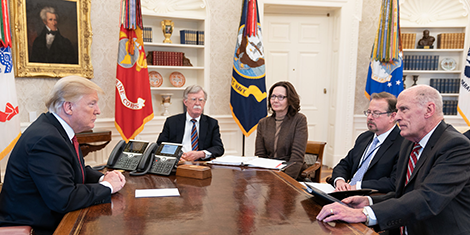
This article was originally published by the Finnish Institute of International Affairs (FIIA) on 13 August 2019.
Headlines are rife with stories about political turmoil in transatlantic relations, and bitter disputes over trade and defence spending. Yet for the US Intelligence Community, ties with transatlantic partners have remained insulated against political differences. History shows that intelligence relationships follow their own logic.
When the United States had major differences with key European allies at the time of the US invasion of Iraq in 2003, the impact on intelligence relations was modest despite the ensuing commotion. New York Post headlines blared “Axis of Weasel: Germany and France wimp out of Iraq”. Members of Congress renamed “French fries”, defiantly calling them “Freedom fries”. The gap between the United States and France was wide and deep.
Yet intelligence cooperation continued. France provided critical intelligence in support of the Bush Administration’s Global War on Terror, and this cooperation continues today – in Europe, the Sahel, and the counter-ISIS coalition. Shared national interests and bonds of cooperation across the services have maintained the relationship intact, focused and successful.
States are complicated actors. Even as they clash on some issues, there is a whole tapestry of relationships with interwoven threads that parties see as mutually beneficial. Governments can usually detect which relationships are worthwhile, and hence need to continue.
When one looks at the contemporary intelligence challenges across the Atlantic, threat assessments are fundamentally shared, covering areas such as terrorism, Russia, Iran, nuclear proliferation and the implications of the rise of China.
Policies on Iran currently differ dramatically on the two sides of the Atlantic. Yet a common denominator is the wish to stay informed about Iran’s nuclear enrichment, and whether it continues to meet the terms of the Joint Comprehensive Plan of Action; as well as Iran’s ballistic missile programme, and its support for terrorism. There are powerful reasons to share intelligence.
All intelligence agreements are highly transactional, addressing the questions of what am I getting, and what am I giving in exchange. The parties who negotiate them are unsentimental and self-interested. Prior to the Arab Spring, US services cooperated on counterterrorism with Muammar Qaddafi, and with Bashar al-Assad. During the Cold War, the United States cooperated with Mao Tse- Tung’s brutal regime on intelligence- gathering on Soviet missiles. It is no secret that the United States can find a way to work with regimes it abhors when it sees a security interest in doing so.
Yet trust and the traditions of cooperation also matter. Five Eyes intelligence cooperation between the English-speaking allies dates back to codebreaking during the Second World War and continues to this very day. In the jargon of the US Intelligence Community, the UK, Canada, Australia and New Zealand are called second-party partners. Cooperation began with signals intelligence, and expanded across the board to encompass collection methods, analysis, technology, organization, and leadership.
When New Zealand stopped allowing US warships to visit its ports in the 1980s because they refused to confirm or deny the presence of nuclear weapons, a serious rift in relations ensued. The Australia, New Zealand, and United States Security Treaty (ANZUS pact) was suspended. High-level diplomatic and defence visits ceased, as did high-level intelligence exchanges. Yet the workaday exchange of intelligence – discussions on collection targets, the sharing of reports – continued.
The United States Intelligence Community also has close relations with non-English-speaking allies, whom it calls third-party partners. These include Germany, France, and the Nordic countries, which are all countries of considerable technical ability. Their geography also makes intelligence cooperation valuable.
President Bill Clinton and Secretary of State Madeleine Albright liked to talk about the United States as “the indispensable nation”. Their view was that nothing of much importance around the world could be accomplished without the United States. That sentiment is largely justified. Whether the United States decides to take up an issue or not makes a big difference. Yet their comment frames issues too narrowly. On every issue of importance, even a great power like the United States can do a better job of protecting and promoting its interests in collaboration with allies and partners.
This statement is certainly true in the world of intelligence. The United States has unparalleled collection and analysis capabilities. Nonetheless, it is also true to say that intelligence-sharing and working with liaison services makes a significant difference and gives the US intelligence community its worldwide advantage.
The notion that political disruptions harm transatlantic intelligence relationships is overstated. By virtue of the fact that the United States and Europe still share key interests and threat assessments, the basis for those intelligence relationships remains strong. A long tradition of cooperation helps sustain them.
There is a widespread tendency to focus on the waves, to focus on the storms that toss ships, whereas more attention should be paid to the ocean itself. Much goes on beneath the surface, even as storms rage above. In the world of intelligence, the fish keep swimming, and pay little heed to the changing weather.
About the Author
Christopher Kojm is Senior Research Fellow at the Elliott School of International Affairs, George Washington University.
For more information on issues and events that shape our world, please visit the CSS website.

